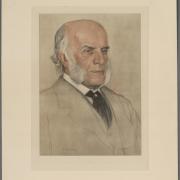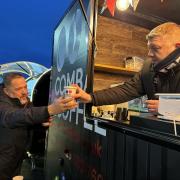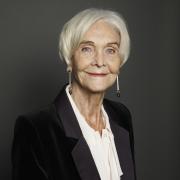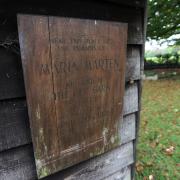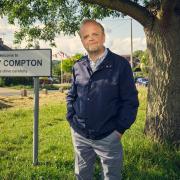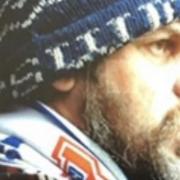Late April, and Rick Wakeman is happy to be home in Suffolk, after almost four months of touring America and South America.
It’s a tough gig for any performer. Rick’s a seasoned traveller, but at least the next one will be a bit nearer.
At the end of June, Rick brings his one-man show to the Southwold Arts Festival. An Evening with Rick Wakeman will be the grand finale to an eclectic week of outstanding entertainment in the seaside town.
The audience will be treated to Rick’s solo show in the setting of Southwold Arts Centre. St Edmunds Hall is cavernous by the standards of most local halls, but far from the arenas and concert venues Rick has performed in throughout his stellar career, as the caped keyboards crusader of the prog-rock band Yes, and as an iconic solo composer/musician.
Rick still does those bigger shows, of course; last year he toured the UK with his nine-piece band, which was ‘good fun’.
But this is an altogether more intimate occasion, Rick on stage with piano and keyboards, performing new material, reprising classics, telling ‘a lot of silly stories’. And he has a lot of stories to tell.

‘Yes, unfortunately I do,’ he says. ‘I’m 75 now – or will be a in a few weeks – and I’ve been doing this pretty much all my life. You’ve only got to have a couple of funny things happen to you in a year you’ve suddenly got 150 stories.
‘Something always happens, often not what you’d expect, so that’s where the stories come from.’
This won’t be Rick’s first Southwold appearance. He was there in 2016 and has been a regular attender of the festival.
‘It’s a lovely festival, with lots of things going on and it’s just great to be part of it,’ he says. ‘It’s grown phenomenally and I think that’s because they give people what they want.
‘It’s not self-indulgent – they put things on of a wide variety. I like to see people go along to things they wouldn’t normally go to, give something a try.’
Indeed, giving things a try probably best describes Rick’s approach to his own music career. He started out as a classically trained pianist. His father, who had played piano with Ted Heath’s Big Band, paid for weekly piano lessons and the young Rick won plenty of awards and competitions.
In 1968 he got a place at the Royal College of Music, intending to become a concert pianist, but quit when the opportunity came along to be a sessions musician. He played with some of the biggest names in rock and pop including David Bowie, Elton John, Marc Bolan, Cat Stevens, and Lou Reed.

In 1970, Rick joined folk-rock group the Strawbs, touring and recording. His repitation as a talented musician and composer grew and the following year he faced the extraordinary dilemma of having to choose between an offer from Bowie to join his new backing band, the Spiders from Mars, and another to join Yes. He chose the latter, playing several stints with the group until 2004, as well as developing his prolific solo career.
He’s been at the forefront of progressive rock for five decades, an iconic figure, hugely influential, recognised for his virtuosity and originality, with a distinctively theatrical appearance in spectacular capes and long blonde hair.
He’s a master of the concept album, the most acclaimed and highest-selling being The Six Wives of Henry VIII (1973), the UK number-one Journey to the Centre of the Earth (1974), and The Myths and Legends of King Arthur and the Knights of the Round Table (1975).
In 1974, he formed his band, the English Rock Ensemble, with whom he continues to perform, and went on to score his first major film, Lisztomania (1975).
He’s done all sorts since – TV appearances, including Grumpy Old Men, Countdown and Have I Got News For You?; radio, everything from Planet Rock to Just a Minute; and books - an autobiography called Say Yes! and two in a Grumpy Old Rockstar Series.
‘I used to have a sign over my desk,’ he recalls, ‘it says ‘success is buried in the garden of failure’, which means I’m not frightened to have a go at anything. If it doesn’t work, move onto the next thing.
‘Too many people say ‘I won’t do that because it could go horribly wrong’. So what if it does? I’ve taken risks all my life.’

Affable and entertaining, Rick Wakeman is anything but a grumpy old rock star and while he’s had a few well documented health issues ¬– some of them self-inflicted – he’s come through some ‘colourful’ years in the music industry in fine style.
His music survives too and when he takes to the stage in Southwold it will, most likely, be a multi-generational audience that greets him.
‘We get a lot of what I call ‘generation families’ come along,’ he says. ‘It’s not uncommon to have mum and dad, son or daughter, their young children and grandma as well. It’s not uncommon to have three, sometimes four, generations, which is lovely – that’s really good.
‘Music is one of those things - like theatre, like comedy - that can hold families together, that gives them something in common.’
It’s certainly a common thread in his own family; his eldest son, Oliver, spent two years playing with Yes and is now a solo keyboardist and composer. His second son, Adam, is currently touring in America with Uriah Heep.
He’s keyboardist and rhythm guitarist for Ozzy Osbourne's band and works with Tony Hadley, among others. Rick’s four other children all play for fun, he says.
Every generation likes to think that the music from their era was the best, but is there some special quality, I wonder, about music from a time that produced so many rock greats? Will it live on for ever, while more recent stuff fades away?
Rick is philosophical. ‘There are fads that come and go, it’s people who decide what’s going to live on,’ he says.
‘But I’m the same as everybody else – I’m an audience and I like what I like. I mean, do I think people will be sitting round the Christmas tree in 50 years’ time rapping? I don’t think they will. They’ll be singing White Christmas and all the classic Christmas stuff.’
Nevertheless, the likes of Bon Jovi (62) and Bruce Springsteen (75) are playing to packed venues, still delivering epic performances. Like them, Rick has no plans to retire.
‘I’ll continue until I can’t do it anymore,’ he says. ‘To use that hackneyed old expression, ‘age is as old as you feel’. Whilst the body is showing signs of wear and tear, the old brain, and the excitement of music and entertaining people is still the same as it always was.
‘I still enjoy it; I love going on stage, I love recording, I love doing TV, I love radio – I love doing all of those kinds of things, so why stop?
‘I think retirement is a strange thing. Does the word retirement mean don’t do anything anymore? Keep yourself busy.’
So no avatars of a 1970s-style caped Rick Wakeman in an ABBA Voyage-type show, then.
‘I’m not sure that would attract a very big audience,’ he laughs, ‘maybe out of curiosity it might. But more of that’s going to happen.’
The ABBA show at Queen Elizabeth Olympic Park in Stratford uses technology to recreate the band’s past vocals and visuals, accompanied by a live orchestra.
It is quite brilliant, he agrees, although shows of that kind have been around for a while. Rick himself was an early adopter of technology in music, such as synthesisers, ‘now incredibly dated’, he says.’ I still use a lot of technology, but I’m no longer in the world of innovation.
‘I’m happy to use technology, although the one golden rule I’ve got is, if you’re playing live, you play live.’

Rick’s current music world is ‘a bit of a mixture’. As well as touring with his band and solo, he’s involved with various collaborations with musicians such as Brian May, and a project with another ‘Suffolk boy’, Griff Rhys Jones, which he’s confident will come to fruition.
He’s happy to take opportunities as they arise. ‘If something comes along and I think it’s really good, then I’ll have a go.’
One very important part of Rick’s professional life has been his membership of the Grand Order of Water Rats, the charity started in 1889 to help people in the entertainment industry, and their dependants, who are in need of support.
Rick is a past King Rat (head) in 2015 and 2016, as was another Suffolk resident, Roy Hudd, who died in 2020. Ian Lavender, who died in February this year was also a member.
‘I’m a trustee of Water Rats,’ says Rick, ‘so I have an inside knowledge of what they do and I’m very proud to be one.
‘We help people who’ve got problems - we look after a lot of widows of entertainers. It’s a bit of a misbelief that everyone in this industry earns a fortune, but often people are left in not a great position. We do it all privately, nothing’s public.’
Rick agrees that the entertainment industry isn’t an easy place to be. ‘You get built up, then once you’ve got to near the top everyone looks forward to knocking you down again.
‘That’s how it works, so you have to be prepared to take the knocks along with the accolades. Ride the bad times and enjoy the good times.
‘I’ve had some unbelievably bad times, but I’ve had some unbelievably good times, and I’m ever the optimist. If something’s not going well, something else will come along if you work hard at it.
‘If we all knew the secret ingredient to success, we’d all be doing incredibly well. But if you can give a fair amount of people what they enjoy listening to, then you can keep going.’
Nevertheless, Rick will be dropping the pace a little. He has a big Christmas tour coming up which includes Ipswich, but he’s stopping the one-man shows after next year, concentrating on other projects and spending less time away from home.
Because when he’s not touring there’s no place he’d rather be than in Suffolk with wife Rachel.
‘I’d like to balance things out a bit more. I enjoy what I do, I love what I do and I’ve got an unbelievably supportive wife. She loves music and supports all the things I do.
‘But I love being at home, out with the dogs. That’s what I really enjoy, and I want to try and do more of that. As the old expression goes, I do not wish to die with my boots on.’
After 16 years living on the Suffolk-Norfolk border, he and Rachel found the house they always hoped would come along, on the Shotley peninsula, a place they’d always had a hankering for.
‘We’ve been here for over a year now and couldn’t be happier. We’ve got two rescue dogs, two rescue cats and a rescue mother-in-law,’ he jokes. ‘I have a view over the river and a creek. It’s beautiful, and if someone said ‘you can’t go away anymore’ I wouldn’t be broken-hearted.’
Life in Suffolk revolves around trips up the coast to Southwold, wandering around Woodbridge, walking the dogs, and… gardening.
‘We love our garden. We know every garden centre within about 50 miles and they know us,’ he says. ‘We’re thoroughly boring - we’re both teetotal, we don’t jetset around the world –but I love it.’
Maybe, I suggest, it’s the secret to a happy and long life. ‘I hope so. I’m very happy.’
Rick Wakeman is at Southwold Arts Festival, June 29, 7.30pm. southwoldartsfestival.co.uk




